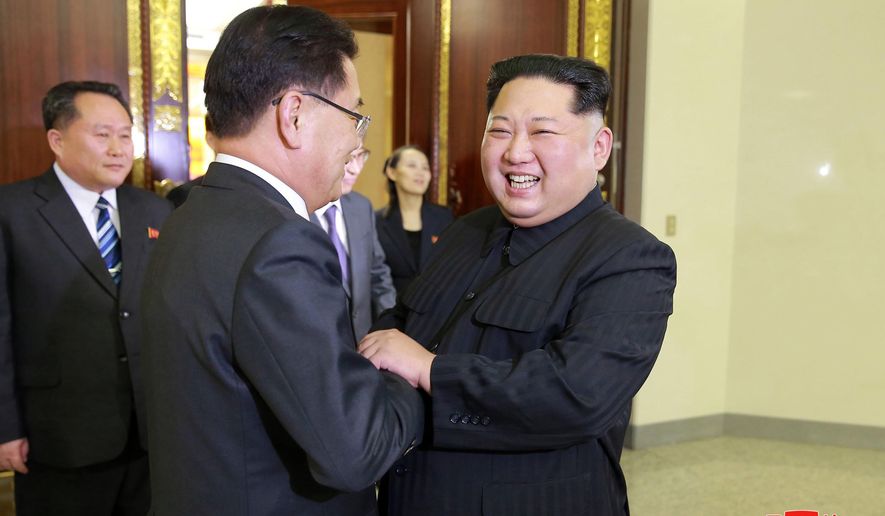WASHINGTON (AP) - President Donald Trump appears to have gotten what he wanted from North Korea: a willingness to suspend nuclear testing and a promise to put its entire arsenal of atomic weapons on the negotiating table. But is it too good to be true?
After a year of threatening “fire and fury” and ridiculing North Korea’s young leader Kim Jong Un, Trump is now touting diplomatic progress between the rival Koreas. He even says he thinks North Korea, under intense sanctions pressure, is “sincere” in wanting an end to the nuclear standoff.
Other U.S. officials voiced greater skepticism Tuesday, reflecting the mammoth questions about North Korea’s intentions. The biggest one of all, perhaps: Why would the isolated nation suddenly change tack after coming so close to achieving its decades-long goal of nuclear weapons that could threaten to hit anywhere in the United States and - in Kim’s view - guarantee the survival of his totalitarian government.
“Developments on the Korean Peninsula can often move with head-spinning speed,” Mark Fitzpatrick, a nuclear expert at the International Institute for Strategic Studies said. “We seem to be in such a period now.”
Trump had his own version, including the Winter Olympics and himself, of the tick-tock leading to Tuesday’s dramatic diplomatic developments in Pyongyang. He contended the lead-up to the South Korean-hosted Games “was not going well” until North Korea “came in out of the blue” and decided to participate.
That made the Olympics “very successful,” according to Trump, who said South Korean President Moon Jae-in credited the United States for having “a lot to do with that, if not everything.”
Later, Trump was asked at a news conference what he thought had made North Koreans open to talks. “Me,” he joked, before crediting U.S.-led sanctions that, with China’s help, are punishing North Korea’s economy.
It was hard for Trump not to relish the moment after being accused so often over his first year in office of taking the world closer to a nuclear confrontation than at any point since the Cold War.
The initial readout from the South Korean talks with Kim seemed to exceed all expectations. Chung Eui-yong, South Korea’s presidential national security director, said North Korea was willing to discuss its nuclear disarmament and halt weapons tests if the two countries enter a negotiation.
Those are precisely the types of concessions Washington has been seeking to start a diplomatic process with the reclusive socialist state. In exchange for their commitments, Chung said, the North Koreans want an end to military threats and a credible security guarantee.
North Korea didn’t confirm the details, and top U.S. officials eyed the news more warily than Trump.
“Maybe this is a breakthrough. I seriously doubt it,” the president’s intelligence chief, Dan Coats, told a Senate hearing.
A senior Trump administration official, who briefed reporters on the developments on condition he not be quoted by name, referenced North Korea’s “27-year history of them breaking every agreement they have ever made.” The official said the United States is “open-minded and we look forward to hearing more, but the North Koreans have earned our skepticism.”
As Trump never tires of saying, past diplomatic efforts with North Korea all have failed. Although an aid-for-disarmament deal in 1994 shut down North Korea’s production of plutonium for bombs for nearly a decade, it collapsed when the U.S. accused the North of running a clandestine uranium program instead.
The latest attempt at dialogue unraveled much more rapidly in 2012, when North Korea upended a nuclear freeze-for-food aid agreement by launching a rocket into space in defiance of the United Nations.
Since then, the North has risked the last remnants of international goodwill with its work on a nuclear-tipped missile that could reach the U.S. mainland. A series of tests in the past year appeared to take North Korea to the brink of such capability, even as the country suffered one round of economic sanctions after another.
Whatever Kim’s motivation, Trump now faces a new set of diplomatic challenges. In raising the pressure on North Korea, Trump has shocked the world with his seemingly throwaway insults of Kim, who has responded in kind. The tit-for-tat sparked fears of the two nations stumbling into a sequel of the devastating 1950-53 Korean War, which ended without a peace treaty.
If the enemies can get to talks, Trump will have to weigh his own concessions to shepherd the process to an agreement. That could mean delaying or altering military drills with South Korea, which the North sees as rehearsals for invasion. Another question will be whether to ease or at least hold off on new sanctions that would risk driving North Korea away from negotiations.
“If Pyongyang demands sanctions relief as a price for coming to the table, then it will fail. The U.S. won’t pay just for talks to start,” Fitzpatrick said. But Trump may have to show flexibility in some other capacity.
Rep. Adam Schiff, the House Intelligence Committee’s top-ranking Democrat, urged Trump to use diplomacy to test Kim’s seriousness about disarming, or to see if he is just seeking to create a wedge between the U.S. and its South Korean ally.
“As Churchill once famously said, ’to jaw-jaw is always better than to war-war,’” Schiff said.




Please read our comment policy before commenting.